IBM Digital Nation Africa
The Digital Wave In Africa

IBM Digital Nation Africa
OVERVIEW
Scope of Work
An app store pilot, to target 25 million young users over the course of the next 5 years in the continent of Africa, bringing a free skills database, and innovation platforms by using IBM Watson cloud and cogniitve technologies.
The “DNA” app will also be used as a database for availble local jobs, job referrals, mentoring young students, and as a social network platform, where users can get connected and exchange ideas.
Challenge
Many young adults living in the continent of Africa still do not have access to the internet, nor own smart phones. They would need to be prepared and mentored in order for them to create an online profile, and enter the job force.

MY ROLE
I was responsible for the IOS app’s overall User Experience strategy and design phases.
- I led the UX/UI and visual design teams.
- I worked closely with all cross-functional teams, stakeholders, subject matter experts, business unit, product team (located in Dubai), development team, and creative, to capture requirements, and translate them into visuals.
- I conducted and facilitated stakeholder and subject matter expert interviews to gather secondary research.
- I interviewed end users, and coducted a user survey.
- I came up with the primary research, and competitive analysis, and created the research plan for the team.
- I gathered business, user and technical requirements, working with business analyst and product owners.
- I created a journey map, site map, user flow, etc.
- I delivered the wireframes, and conducted dayly scrum meetings with the core teams.
- I led UI designers into creating the visuals and the prototype.
INTRO
IBM Launches “Digital – Nation Africa”: Invests $70 Million to Bring Digital Skills to Africa with Free, Watson-Powered Skills Platform for 25 million people.
IBM is investing $70 million in building much-needed digital, cloud, and cognitive IT skills to help support a 21st century workforce in Africa.
The initiative, “IBM Digital – Nation Africa”, provides a cloud-based learning platform designed to provide free skills development programs for up to 25 million African youths over five years, enabling digital competence and nurturing innovation in Africa.
PROJECT COMPONENTS
IBM Digital – Nation Africa Portal: Enablement multimedia material for all competency levels including games and applications.
IBM Virtual Box: Learn Linux, cool web apps and even become socially active in the digital world.
IBM CODE & Play Toolbox: Learn to code, develop apps and even invoke innovative services from IBM Watson and Bluemix.
IBM Apps Marketplace: A new apps ecosystem where you find the coolest mobile and web apps, and even host your own.
IBM Volunteers space: Connect with IBM mentors around the world and engage with other volunteer communities.
IBM Cognitive New Collar Advisor: An easy guide into your next job.
USER RESEARCH
summary
Africa is the world’s most powerful continent. Today, nearly 50 percent of Africans are under age 15.
Africa’s young people are the future leaders and will be the driving force behind sustainable growth across the continent. Investment in education and training is essential in building an educated and skilled workforce and to encourage innovation.
Recovering from many years of lack of growth and development, the continent of Africa is now home to seven of the world’s 10 fastest growing economies.
The significant strides in Africa’s socio-economic progress have helped to grow a vibrant middle class and propel technological advancements at a rapid pace.

Research studies based on Brookings Institution Center for Universal Education
Four Dimensions
- Enrollment
- Completion
- Learning
- Inequality
School Completion
Only 6% of students enroll in tertiary education
in Africa.
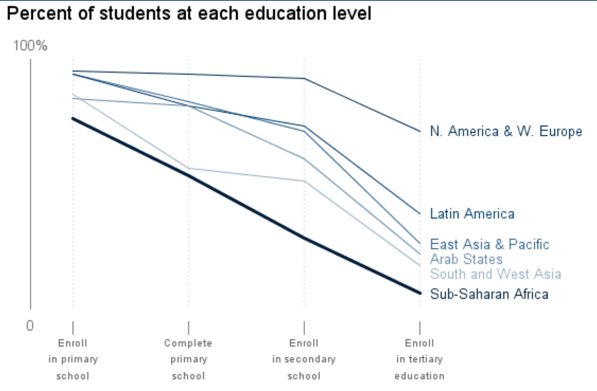
7 countries where over 40% of school children are not learning:
- Chad (40%)
- Ivory Coast (41%)
- Benin (41.7%)
- Malawi (48.3%)
- Ethiopia (55.3%)
- Zambia (55.7%)
- Nigeria (58.3%)
Smartphone research conducted by PEW Research Center
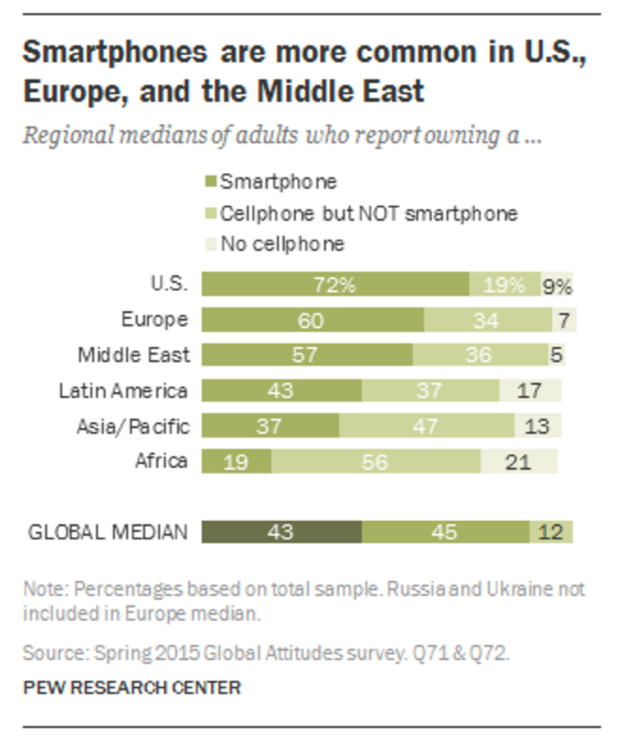
Key Statistics: UNESCO, World Bank
The power of effective teaching can transform children for the rest of their lives. However, a severe shortage of trained teachers is a stark reality for much of the continent, impacting overall learning outcomes. In 2012, the average pupil/teacher ratio in primary school was 42:1. That statistic has not changed since 1999.
For primary education alone, one million
new teachers need to be recruited in Africa to achieve the universal primary education development target.
African students are not on the receiving end of enough quality teaching time in the classroom.
International standards recommend that primary schools operate between 850 and 1,000 hours per year. In contrast, African countries mandated 720 hours of instructional time per year in the early primary grades, progressively increasing to about 830 hours by grade 8.
The number of private schools across Africa for primary and secondary education continues to rise. In a UNESCO survey of 25 African countries, the proportion of private primary schools increased from 9 percent to almost 10 percent between 2000 and 2008.
Source: UNESCO, World Bank
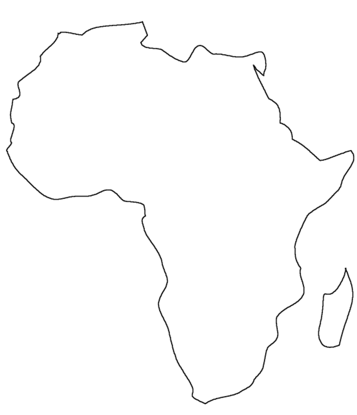
— The Africa-Amnerica Institute
IBM’s Involvement
Through a free, cloud-based online learning environment delivered on IBM Bluemix, the premier cloud platform for business, the initiative will provide a range of programs from basic IT literacy to highly sought-after advanced IT skills including social engagement, digital privacy, and cyber protection.
Advanced users will be able to explore career-oriented IT topics including programming, cybersecurity, data science and agile methodologies, as well as important business skills like critical thinking, innovation, and entrepreneurship. The initiative aims to empower African citizens, entrepreneurs, and communities with the knowledge and tools to design, develop, and launch their own digital solutions.
IBM has a direct presence in 24 African countries and has made several significant investments on the continent in recent years, including offices, innovation centers and other advanced facilities. The company has a research laboratory in Nairobi, Kenya and opened a second research facility in Johannesburg, South Africa in 2016.
In 2015, IBM rolled out a major initiative to expand its Africa Technical Academy and Africa University Program, providing advanced skills in cloud, analytics, and big data technologies, reaching today to over 150 academic institutions, in the continent.
In September 2016, a memorandum of understanding was signed between the Ministry of National Education and Vocational Training and IBM Morocco, for the launch of P-TECH program (Pathways in Technology Early College High School) in Morocco. P-tech is an innovative global education model, designed by IBM, in close partnership with American educators. The company is also working with dozens of start-ups in South Africa.
IBM has been present in Africa since the 1920’s, and has a long history of collaborating with educational institutions and providing transformational solutions focused on providing value to higher education and its contribution to society.
Sitemap


Wireframes
Sign up

Sign up form

Sign in

Select your level
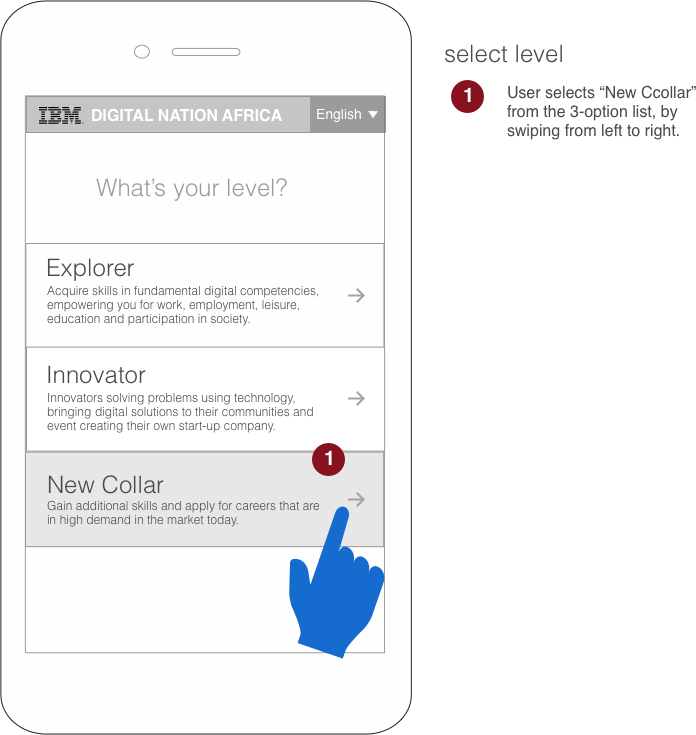
Dashboard home

Jobs drop down
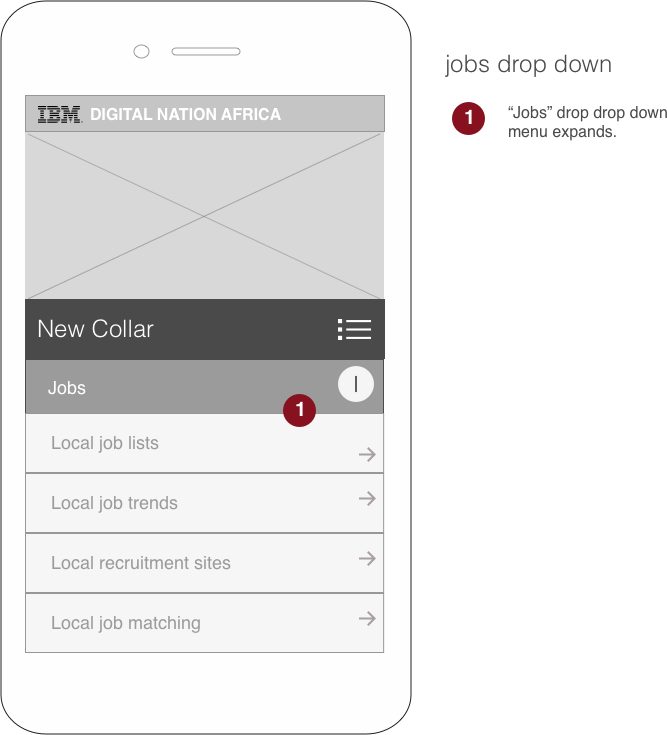
Local job lists

Local job list expanded

Job description/apply

Selected job trends
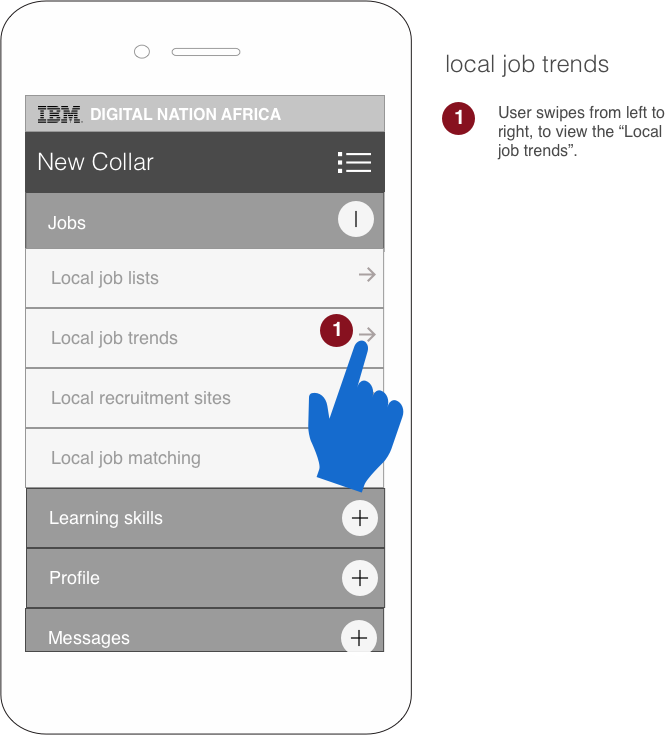
Local job trends landing page

Jobs landing page
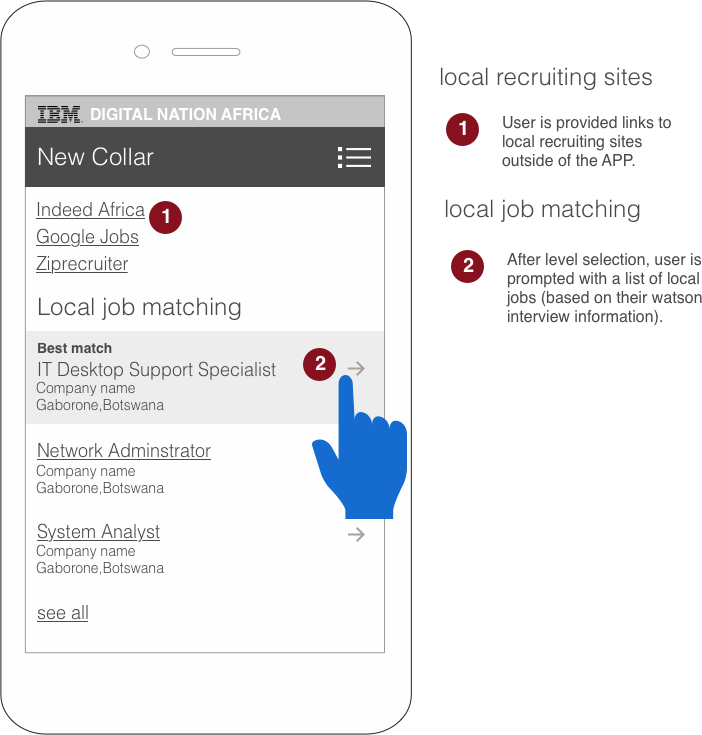
Learning skills

Top ten skills
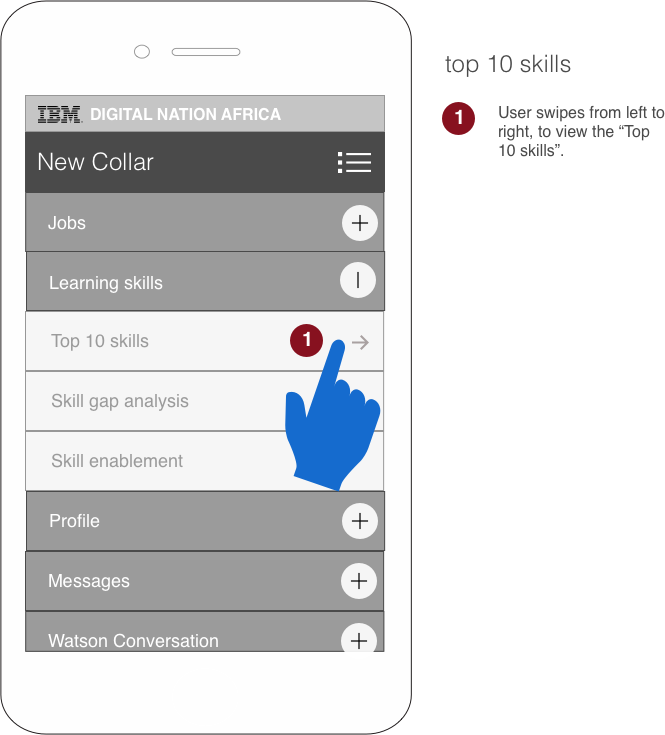
Top ten skill landing page

Top ten skill: prgramming
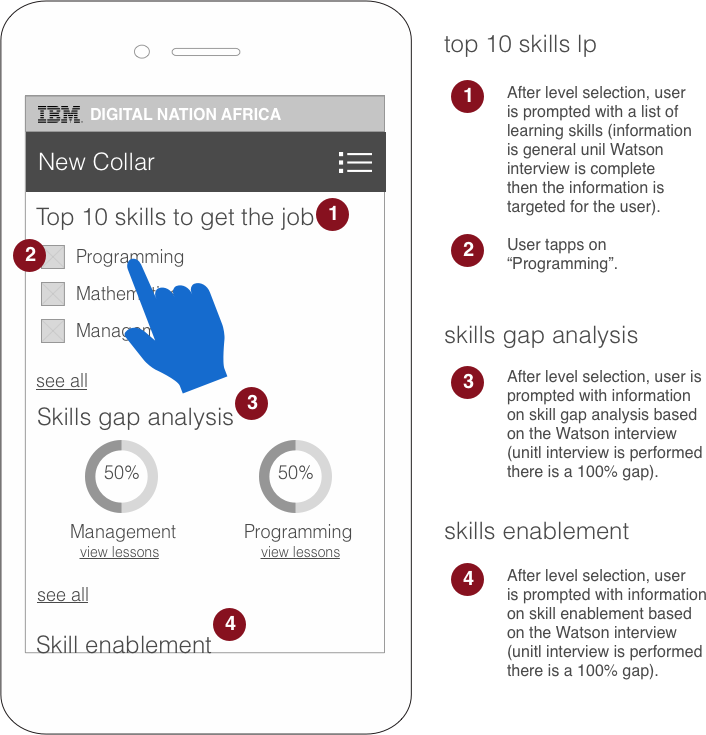
Go to your profile

Watson convo landing page
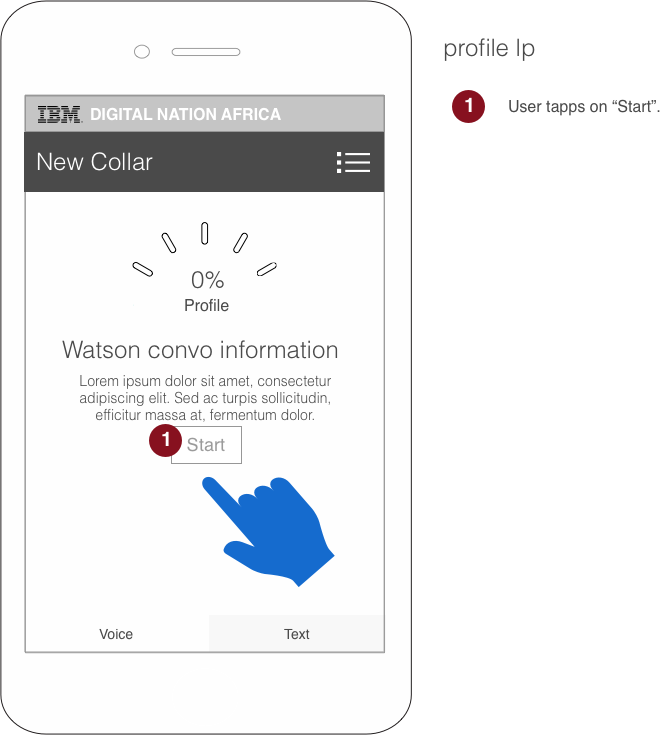
Profile page: logged in
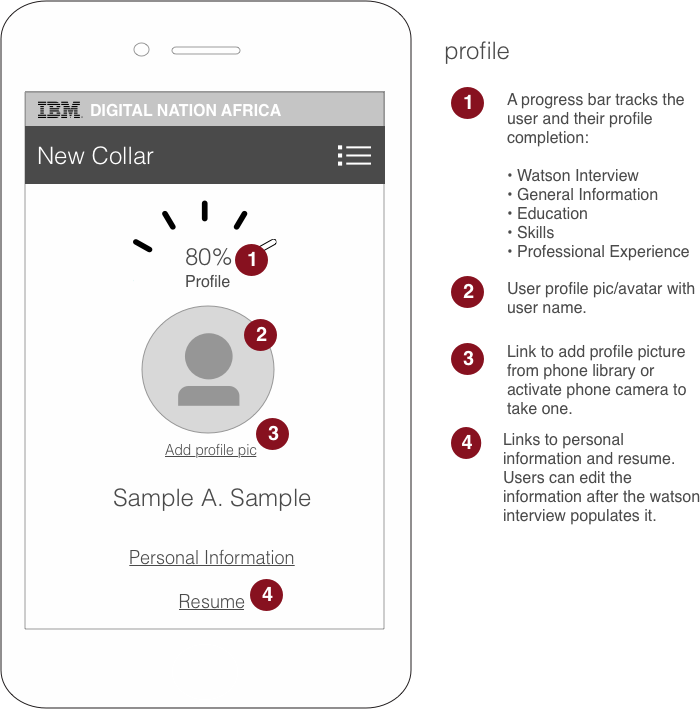
Profile/personal information

Profile/personal info/review/edit

Messages landing page
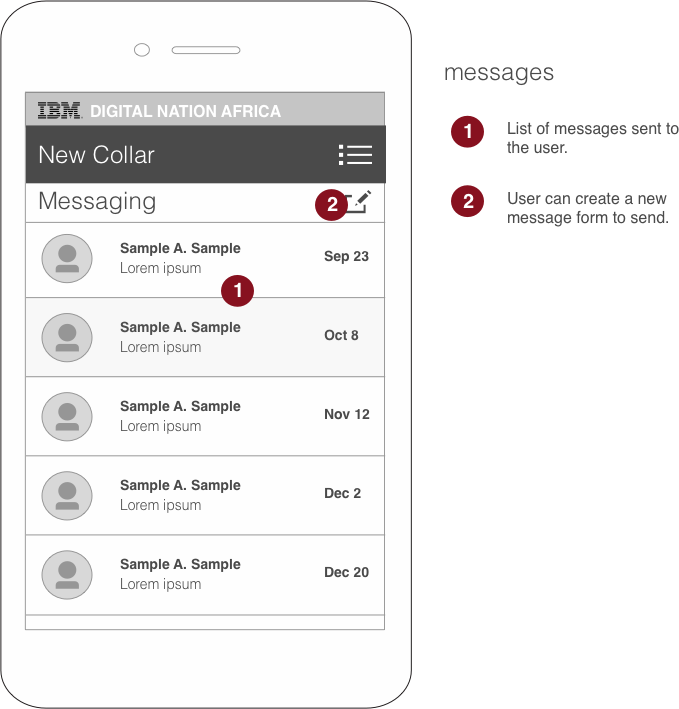
Conclusion/Final Reflections
This was an exciting project, challenging and exciting! I was fortunate to work with a talented group of designers and product owners and manager. Our core team located in Dubai, this project’s stakeholders and SMEs, was very appreciative of our work, and extremely helpful to the overall end-to-end UX processes.